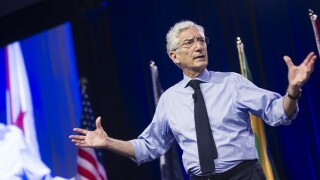Content Types
-
Bertrand de Mazières is one of the best known and most respected figures in European debt capital markets. As director general of finance at the European Investment Bank (EIB), he oversees one of Europe’s most important bond issuers, a status not only due to the amount it issues each year, but also its role as a setter of standards and benchmarks for rest of the market — in good times and bad.
-
Durreen Shahnaz is founder and chief executive of Impact Investment Exchange (IIX), which says it created the world's first social stock exchange. She tells GlobalCapital about how we can rebuild a better economy, with the help of capital markets, after coronavirus.
-
Each week, Keeping Tabs brings you the very best of what we in the GlobalCapital newsroom have found most useful, interesting and informative from around the web. This week: supervising financial reporting, a discordant health and financial picture in emerging markets, and managing climate risk.
-
Sir Ronald Cohen, one of the UK’s foremost private equity entrepreneurs, believes the Covid-19 crisis is an opportunity to transform western capitalism into a socially responsible enterprise that values a company’s impact on society as much as its profits. Cohen talks to GlobalCapital about the tremendous challenges facing the global economy, and how it can be transformed for the better.
-
Each week, Keeping Tabs brings you the very best of what we in the GlobalCapital newsroom have found most useful, interesting and informative from around the web. This week: remote working challenges and opportunities, rethinking discrimination in economics, and how volatility strategies fell apart in the market crash.
-
Fahmi Quadir, founder of short-only Safkhet Capital, tells GlobalCapital her hedge fund increased its short position in Wirecard as the crisis surrounding it unfolded. She said German regulator BaFin should have properly investigated the claims levelled at Wirecard years ago, and pointed to the problem of auditors developing long-term relationships with companies.
-
‘Angrynomics’, a well-timed book on anger and how it relates to politics, economics and finance by Eric Lonergan and Mark Blyth, is published this week. GlobalCapital spoke to Lonergan to discuss its meaning.
-
BBVA is expected to take advantage of recent changes to Pillar 2 requirements with a greater proportion of senior preferred issuance but it has a modest need for subordinated issuance. The Spanish national champion also plans to make use of its Targeted Longer-Term Refinancing Operation (TLTRO) allotment from the ECB, which has been substantially increased.
-
John Hempton, the Australian short seller and self-styled eccentric, believes fraudulent companies will soon become evident in the corporate rubble left by the coronavirus pandemic. Hempton, who has bet against 1,100 companies over the course of his career, explained how his hedge fund Bronte Capital goes about finding rotten eggs in business and finance.
-
Each week, Keeping Tabs brings you the very best of what we in the GlobalCapital newsroom have found most useful, interesting and informative from around the web. This week: a debate about the riskiness of CLOs to US banks, the role of the euro and more.
-
Marcus John, founder and chief executive of Sports Capital Advisors, tells GlobalCapital to expect a wave of insolvencies in national sport leagues but, he believes, sports with global appeal should fare better after lockdowns ease. Whether TV rights, a key source of revenue for major leagues, will be impacted remains unclear.
-
Each week, GlobalCapital journalists share some of the most interesting things they have been reading, from the profound to the quirky. This week has been marked by widespread protests across the US and the wider world, in reaction to an unarmed African-American man, George Floyd, dying while a policeman knelt on his neck in Minneapolis.










